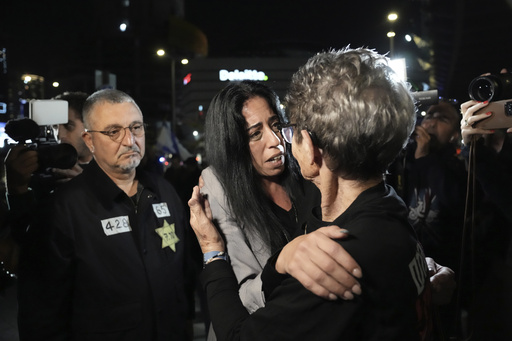
KIRYAT GAT, Israel — Ilana Gritzewsky is in a race against time, working hard to rescue her boyfriend from the grips of Hamas. With discussions seemingly advancing towards a potential deal for the release of hostages in stages, it remains uncertain if Matan Zangauker, who recently celebrated his 25th birthday, will be part of the first group released. Gritzewsky fears that negotiations could collapse or that her boyfriend might not survive captivity before he is rescued.
Having endured her own harrowing experience, Gritzewsky is all too aware of the dangers her boyfriend faces. Last year, she was held hostage for 55 days and was released during a ceasefire agreement. “It’s crucial that all hostages are freed,” Gritzewsky asserted. “If we don’t secure the release of every captive, they may die in captivity.”
Families of individuals held in Gaza continue to feel the weight of anxiety about their loved ones despite reports suggesting progress in negotiations for their release. This resurgence in ceasefire discussions comes amidst more than 14 months of torment and uncertainty regarding the fates of the hostages. Even as global attention shifts elsewhere, these families tirelessly advocate for their loved ones’ safe return.
“I promised my friends in the kibbutz before leaving that I would do everything possible to bring them back from that hell. I constantly ask myself: Am I doing everything I can?” Gritzewsky, 31, shared.
On October 7, 2023, Hamas launched a surprise attack on southern Israel, resulting in the deaths of approximately 1,200 people and the abduction of about 250 individuals taken into Gaza. This triggered an Israeli military response in Gaza. Current estimates from local health authorities suggest that over 45,000 people have died in the ongoing conflict, with a significant number being women and children, although the reports don’t clarify civilian versus militant casualties.
A brief ceasefire in November 2023 led to the release of around 100 hostages, while others have been rescued or their bodies retrieved by Israeli forces. Yet, another 100 hostages still remain unaccounted for, and Israeli officials believe that at least one-third of them may have already perished.
The proposed deal includes releasing primarily women and older hostages during the initial six to eight weeks, but many families are lobbying for a collective release of all hostages simultaneously. Gritzewsky and Zangauker were both kidnapped from Kibbutz Nir Oz, where they once lived together, and have been held separately since. Just before her own release, Gritzewsky learned that Zangauker was nearby but was denied a chance to see him.
Recently, Hamas released a video of Zangauker under coercion, where he described the harsh circumstances in Gaza and urged Israeli Prime Minister Benjamin Netanyahu to negotiate a resolution. Gritzewsky noted, “He spoke softly, but his eyes were pleading for help.”
Although it was somewhat reassuring to see Zangauker, Gritzewsky expressed that the video does not assure his safety. “What I want is not a video or photo; I want him to be here. I want all hostages to come home,” she stated. The video stirred painful memories of her own time in captivity, filled with midnight interrogations, unsanitary conditions, and inadequate medical care for the injuries she sustained during her kidnapping. Gritzewsky suffered multiple broken bones and has scars that serve as constant reminders of her ordeal.
“They are subjected to relentless physical, psychological, and emotional torture,” Gritzewsky explained, wearing a hat belonging to Zangauker that she saved from their damaged house. She articulated the torment of being deprived of basic needs, sleep, and reality during captivity.
Despite her discomfort with being in the spotlight and recounting her traumatic experiences, Gritzewsky has consistently participated in protests and demonstrations nationwide, often alongside Zangauker’s mother, who has emerged as a prominent advocate for the hostages.
Einav Zangauker, once an ally of Netanyahu, has now become vocally critical of his administration’s handling of the crisis. She is furious over the government’s failure to reach a ceasefire that prioritizes the hostages, claiming that the government has abandoned them in its pursuit to dismantle Hamas.
Netanyahu insists that military efforts must continue until Hamas is fully incapacitated. In response, critics argue that Israel has already targeted key leaders and inflicted significant damage to Gaza.
As a single mother, Einav Zangauker has passionately campaigned for her son’s return, attending daily protests and engaging with major media to raise awareness. At a recent parliamentary committee meeting, she fiercely declared, “If my son returns in a body bag or body parts, I won’t seek legal action against you—I will take justice into my own hands!”
Though Gritzewsky is no longer in captivity, she finds little solace. Healing seems impossible until all hostages, especially Zangauker, return safely. “Since October 7, it feels like time has stopped for me,” she reflected. “I watch life go on around me while my own existence has been shattered into pieces.”
